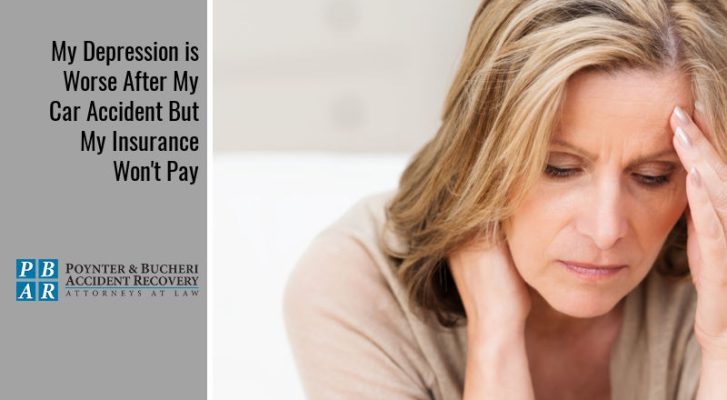
Signs of Depression After A Car Accident But My Insurance Won’t Pay

When considering the damages that a person can sustain from being in a car accident, most people tend to think of the physical injuries and car damage. However, there are more intangible damages that a person can suffer from, such as emotional distress. Though some get over the emotional trauma they experience after a car accident with ease, others may struggle more and suffer from more severe and debilitating mental anguish and PTSD. So, what happens if you show signs of depression after a car accident and your depression gets worse after your accident but your insurance won’t pay?
Generally, if your accident is the result of someone else’s negligent actions, you have a right to file a personal injury claim to pursue compensation for things like medical bills, loss of wages, and even emotional distress. You may even be able to obtain no-fault benefits through your own insurance. Personal injury claim compensation and no-fault benefits can help cover the cost of damages such as mental anguish that directly result from an accident—but what happens when the accident exacerbates pre-existing mental health issues, like depression?
Mental Health Can Be Affected By a Car Accident
Though many struggle with their mental health through no fault of their own as a result of chemical imbalances in the brain, some forms of mental illness can happen as a result of traumatic incidents, such as a car accident. It is actually quite common for those who have experienced tragic and traumatizing events to develop severe emotional distress and PTSD. If you already suffered from something like depression before the accident, your symptoms can become even worse as a result.
Signs You Are Suffering Mental Anguish Following an Accident
Car accidents can trigger relapses of pre-existing mental illnesses like depression. This disease is extremely common amongst individuals today, and it can be made worse by traumatic incidents throughout a person’s life. The symptoms and severity of depression can vary from person to person. However, there are some more common signs and symptoms you can look out for if you suspect you are suffering as a result of a car accident.
Depression symptoms after a car accident can include:
- Anxiety
- Loss of interest and enjoyment of life
- Headaches
- Constant feelings of sadness and hopelessness
- Feeling numb to emotions
- Insomnia
- Changes in mood
- Changes in appetite
- Difficulty concentrating
- Crying spells
- Irritability
- Frequent thoughts of death or suicide
Pre-Existing Depression and Car Accidents
There are rules in place to help protect car accident victims from being denied benefits due to pre-existing conditions. The thought behind these rules is that some people are more susceptible to injury than others, and even though they are at an increased risk of suffering after an accident, that does not mean they should be denied benefits or compensation.
For example, elderly individuals are more likely to suffer severe injuries after a car accident because their bodies are not as strong and healthy as someone younger. If an older adult breaks their leg in a car accident, they will not be denied benefits simply because their leg bones were already more fragile.
The same applies to someone with pre-existing mental illness and depression. Just because you are more prone to suffering emotionally due to your depression does not mean you should be ineligible to receive benefits if your depression worsens after a car accident.
Proving Your Depression Got Worse As a Result of a Car Accident
Though this rule exists, proving that your signs of depression after a car accident got worse can still be challenging. Insurance companies often look for ways to deny claims, so they will often do whatever they can to prove they do not owe you money. This includes trying to claim that your depression existed before the accident and that it simply got worse on its own or as a result of something other than the car accident.
In these cases, it is crucial to hire a personal injury lawyer who can help you fight against insurance companies to ensure you get the compensation you deserve. If you struggled with depression prior to the accident, but the traumatic experience made it worse, you and your attorney will need to work together to prove this to the court. To do so, you will need to prove that:
- Your depression existed before the accident.
- Your depression was exacerbated by the accident.
- You have been treated for your depression since the accident occurred.
The last point is essential to winning your case. Following the accident, you should seek immediate medical attention, including seeing a doctor for your depression. Without documents showing that your depression was so bad that it required medical treatment or therapy, it will be difficult to prove to the court that the insurance company owes you money for this particular issue.
Poynter & Bucheri Accident Recovery — Indianapolis Personal Injury Attorneys
If you or someone you love has been the victim of a car accident and is suffering from worsening depression, contact the accident recovery experts at Poynter & Bucheri. We understand that dealing with a difficult insurance company when you are struggling with your mental health can be emotionally exhausting. Our personal injury attorneys know how to handle these kinds of cases to help you get the highest compensation possible.
Don’t hesitate — one of our experienced attorneys can assist you right away. Call 1-800-265-9881 for a free case review.
